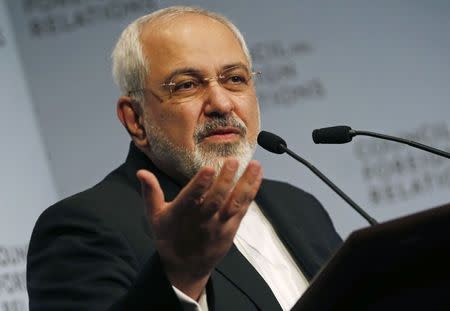U.S., Iran, EU to meet in Vienna as nuclear deal deadline looms

DUBAI/BRUSSELS (Reuters) - The top diplomats of the United States, Iran and the European Union will meet in Vienna next week, accelerating efforts to clinch a long-elusive deal to end a dispute over Tehran's nuclear programme by a Nov. 24 deadline. European Union foreign policy chief Catherine Ashton is to meet Iranian Foreign Minister Mohammad Javad Zarif on Oct. 14 and the two will be joined the next day by U.S. Secretary of State John Kerry, the EU said in a statement. The talks will take place with only six weeks to go before the self-imposed November target date to reach a diplomatic settlement to resolve the decade-old standoff over Iran's nuclear programme and dispel fears of a new Middle East war. Iranian and Western diplomats say significant differences remain over the future scope of Iran's uranium enrichment activity and that a successful outcome is not guaranteed, despite a political commitment to seek an agreement. Iran and the world powers - the United States, France, Germany, China, Russia and Britain - have held a series of meetings since early this year to try and narrow the gaps. Next week's talks in the Austrian capital "form part of the intensive diplomatic efforts" to reach a comprehensive solution by Nov. 24, Ashton's office said. She leads contacts with Iran on behalf of the six powers. Senior Iranian officials have said that Iran was likely to meet bilaterally with the United States in Vienna and then hold a full session with the six powers in November. Iranian Foreign Ministry spokeswoman Marzie Afkham earlier on Wednesday said "bilateral and multilateral talks" would take place next week in Vienna, but did elaborate. Iran rejects Western allegations that it is seeking nuclear weapons capability. It says its nuclear programme is solely for peaceful energy purposes. The two sides missed a July 20 deadline for a comprehensive nuclear deal, extending the talks by four months. Iranian President Hassan Rouhani said that there was consensus between Iran and the powers "on fundamental issues and differences are over fine details", according to an official IRNA news agency report late on Tuesday. "There’s no dispute over whether reactors should be built in Arak or if Iran should enjoy enrichment technology or about Fordow or the end of so-called (nuclear) military activities. Differences are mainly over details and quantities," he said. Iran has refused to close down an underground uranium enrichment plant at Fordow and a planned heavy-water reactor at Arak with the potential to yield plutonium. Separately, a U.N. nuclear agency team is holding talks in Tehran this week, Iranian media say, in an apparent effort to advance a long-running investigation into suspected atomic bomb research by the country. Iran denies the accusations but has promised to work with the IAEA to help clear up the suspicions. (Reporting by Michelle Moghtader, Mehrdad Balali, Fredrik Dahl in Vienna, Parisa Hafezi in Ankara and Robin Emmott in Brussels, editing by Mark Heinrich)

